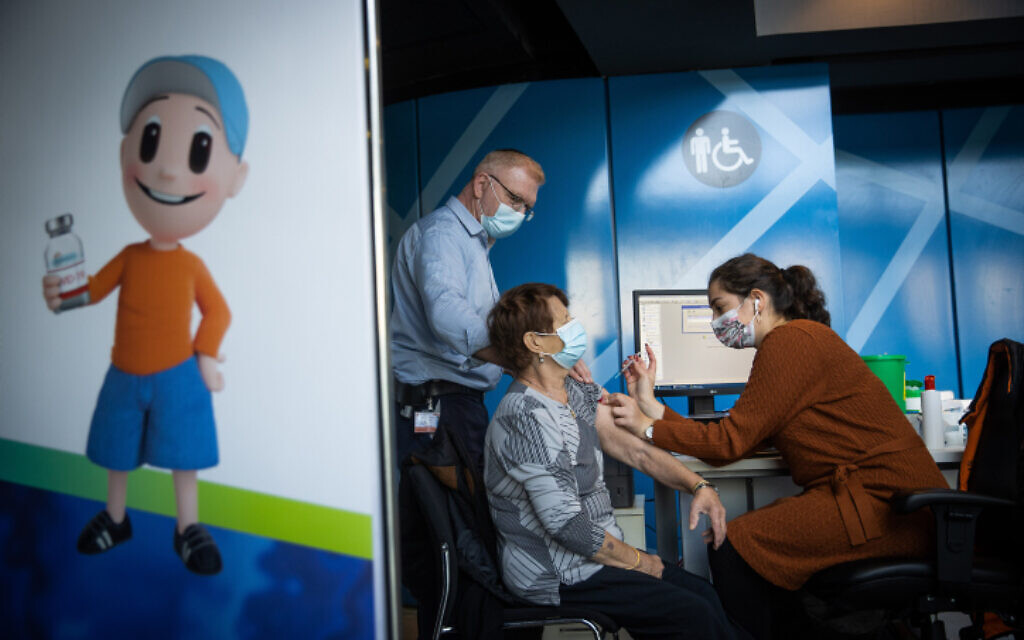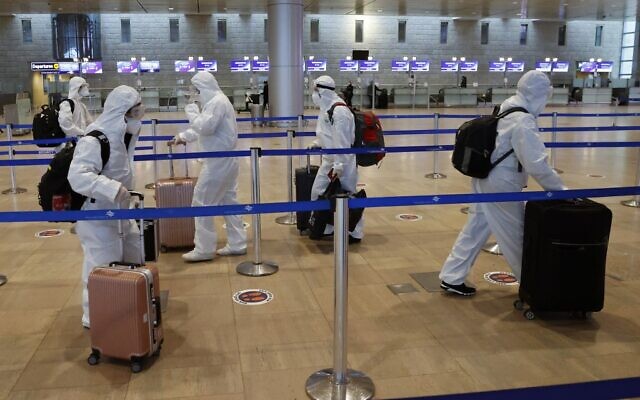Israel’s surge in vaccinations means recent emigrants could get immunized sooner by flying home than staying put, but logistical hurdles make it near-impossible to achieve

When Beny Falkovich leaves his home in Boston for a much-anticipated trip home to Israel this upcoming March, he will see his family and friends after many long months. But there’s another thing Falkovich hopes to accomplish on his trip: to roll up his sleeve and get vaccinated against COVID-19.

As Israel races ahead of the rest of the world with more than 2.5 million people receiving their first vaccination, some Israelis who live abroad are eyeing the possibility of combining a trip home with a coronavirus vaccination that may not be available for months in their new home countries.
“It seems like, in Israel, I can get the vaccine way faster than [Boston],” said Falkovich, who is working towards his PhD in biochemistry at the Massachusetts Institute of Technology in Cambridge, and has been in the United States, along with his wife, for a year and a half.
“I’ll be in the last group [in Boston] to get vaccinated,” Falkovich said, noting that he does not expect his turn to come until the summer at the earliest. “But in Israel, they say they’ll get to most of the general population by March. I’ve seen the protocol and it seems very realistic.”
Israel has vaccinated more than a quarter of the country’s population, including adults over 40 and 11th and 12th graders. Recently, the country set a daily record of 220,000 vaccinated in a single day. The US has vaccinated 22.4 million people, but so far the vaccine rollout has been haphazard and widely criticized.
Falkovich has hoped to visit his family in Israel for a long time, but the trip kept getting pushed back, as coronavirus cases surged in both countries.
“There are still worries — about quarantining, or that we may also get it on the flight, or that we could get people in Israel sick. All those concerns are still there,” said Falkovich. But the possibility of obtaining a vaccine months earlier could tip the scale towards traveling.
“Things are changing so quickly, I’m just trying to keep my finger on the pulse of what’s going on, and even though I know it could change at any time, we’re thinking to time the trip in March so that we could get [the vaccine] then,” he said.
Despite some individuals’ plans, Israel does not need to start bracing for an influx of former citizens scattered around the world. Only citizens who are abroad for fewer than five years, remain active members of their HMOs (kupat holim), and pay their monthly National Insurance payments can sign up to make appointments for vaccination. After Israelis live abroad for more than five years, their National Insurance accounts are automatically frozen. The National Insurance account can be reactivated once they return to Israel to live, explained National Insurance Institute spokesman Haim Fitusi.
However, Israel’s Ministry of Health has ordered the implementation of free vaccinations for anyone who is in Israel, regardless of citizenship status or whether or not they have insurance.
All the same, vaccinating in Israel is only realistic for someone who can spend at least a month and a half in the country. First the potential candidate must complete a 10-14 day quarantine, and then wait at least three weeks between the two vaccination doses.
Falkovich said he can complete much of his research remotely, so he does not mind the long trip. Both he and his brother, who lives in New York, are anxious to get the vaccine as soon as they can.
“My brother is more worried about the new variant in England, and that there could be another wave. So he feels like he really wants to go [to Israel to vaccinate] as soon as possible,” he said.

Multiple spokespeople for the Israeli Health Ministry declined to comment on whether or how Israelis living abroad could sign up for vaccination appointments. Those Israelis who already have plans to come home could be thrown a curveball by the decision to close Ben Gurion Airport for a week over fears of the new coronavirus variants, beginning at midnight January 25.
Einav Hadari, the deputy spokeswoman of the Israeli Embassy in Washington, DC, said the Foreign Ministry was not aware of a large number of Israelis who live abroad who were planning on returning for vaccinations. But she noted that any Israeli who meets the qualifications for vaccinations according to the Health Ministry would be welcome to get a vaccine, regardless of current country of residence.
“We’re not treating this as a matter of concern because we aren’t concerned,” Hadari said. “The State of Israel is vaccinating all Israeli citizens. It does not matter if they have health insurance in another country as well.”
“There’s no ‘vaccine tourism’ here, because we don’t consider Israeli citizens to be tourists, even if they are currently living outside of the country,” Hadari emphasized.
Deftly zooming in Delft
Gil Cohen, 35, is in his first year of getting his masters in Urban Planning at the University of Delft in Holland. Though he moved to Holland aware that the majority of his classes would be online, he hoped to make the most of in-person small working groups that the university promised. But when Delft, one of the biggest college towns in Holland, became the epicenter of coronavirus transmissions in the fall, even the work groups were cancelled.

Cohen vacillated between staying in Holland for the following semester and returning to Israel. If he went back to Israel and some of the lockdown conditions eased in Holland, he would miss the collaborative small work groups he hoped to experience in his studies. In the end, it was the ability to be vaccinated that pushed him to return to Israel, rather than wait for better conditions in Holland.
“This adds another reason to travel that makes me feel like it’s the more responsible and mature decision [to go back to Israel],” said Cohen. “It’s nice to know that Israel is working at least in this regard, medically. I definitely appreciate the health system, and also the climate, after being in Holland.”
Falkovich and Cohen are in the minority of Israeli expats who are thinking of traveling to Israel for a vaccine. For his part, Falkovich is grateful that he has the ability to choose.
“It’s more about luck, I feel lucky to be Israeli,” he said. “I’m happy that I have the option.”
As reported by The Times of Israel
